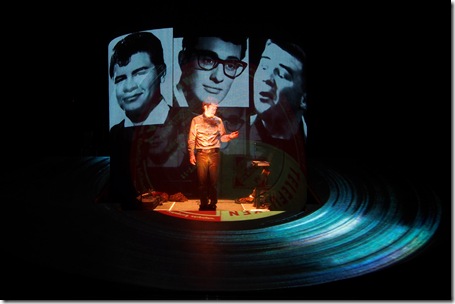Boom: superficial approach to history but a superb performance by Rick Miller!
Photo David Leclerc
The long awaited Boom directed, written and performed by Rick Miller is both seductive and questionable, especially as it purports to be a cultural history of the Baby Boomer generation that will incite young people to become interested in their own stories as well as world history. It turns out to be an amalgamation of various narrative structures that function in different ways, some are successful and others much less so. Rick the actor begins by introducing us to a film of Maddy his mother, projected against a huge pole of light that stands in the centre of the stage. This is the background against which all the floating images, the films, the lighting effects and the great mass of visual information will unfold during the evening. Structured by chronological time (1945-1969), the stage event becomes, the story of Rick’s own life told through fragments of historical information and personal experiences by multiple voices whose identities are not at all clear and who splinter the whole narrative into so many pieces it is difficult to locate any kind of centre.
The relationships among all these people are explained at the end but in the meantime, the voices just became random representatives of important historical events, of great musical performances of each year, as headlines flow along the background of the stage filling us in with journalistic titles that highlight the years as they move along. Noteworthy are his remarks pertaining to the development of Quebec nationalism which were not correct and should be rethought. At that period, it was essentially an anti-colonial movement influenced by Fanon but Miller somehow brought it back to Ghandi and Martin luther King.
On the other hand, apart from the interplay between the voices from Rick’s own past, historical, scientific, and cultural events flash by at breath-taking speed in images we have learned to expect from people who work with Lepage’s Ex Machina centre in Quebec. In this show then, the historical content becomes extremely superficial, appealing to the younger generation’s inability to concentrate on anything for more than three minutes which is how the images seem to be set up.
All the individuals that flow across the stage as shadows or film collage , all the great stage and TV events roll by so quickly I don’t see how the current generation could even grasp any historical meaning at all. History becomes like a book of cartoons. The audience is bombarded with images, with sounds , with lighting effect to the point where only those spectators who lived through that period would have their memory jolted enough to give the performance some meaning. Otherwise we watch empty but highly seductive images that are pure entertainment and bring no meaning to the world even though the Production Company Kidoons and WYRD affirms that this is an ongoing process of the representation of history.
The stories that appear most meaningful are the personal references created by each individual invited to take part in the event. Otherwise, the format brings nothing substantial to the understanding of history, and that is what bothers me.
What did stand out was the brilliant performance by actor Rick Miller who became a powerful singing, and speaking voice. He did not lip synch as one is tempted to believe because it was all so perfect. He mimicked all the great singers, all the political figures, all the best known and less well known icons of that period and brought them all to life even for a few minutes. The nervous shadow of Janis Joplin with her scratchy wounded voice leaped before us, the voices of Mick Jagger, a bit more of David Bowie singing from space , Buddy Holly, Pee Wee King, Joe Cocker, Sly and the Family Stone, Pete Townshend whom Miller actually impersonated on stage. but there were others. We heard speeches by Winston Churchill, John Lennon, Pierre Trudeau, always tossing in a reference to current politics. Even his imitation of a certain Laurence, playing the harmonica, a black musician and American draft dodger from the 1960.s who became a voice of protest and criticism in the face of white politics, was transformed into a totally believable character even though we had no idea who he was, until the very end. It was these fragments of superb imitation and skilled acting that kept the show rolling.
Boom plays in the theatre of the NAC until March 12
Written, directed and performed by Rick Miller
Bruno Matte Lighting design
Creighton Doane Composer and sound designer
Yannik Larivée Set, costume, props designer
Logograph Graphic design, multimedia and marketing.
A Kidoons and Wyrd Production
